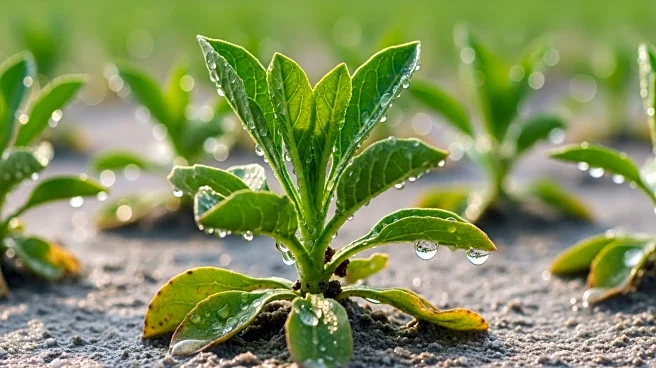What's Happening?
Saline agriculture is being explored as a promising approach to address soil salinization, a major issue affecting crop yields worldwide. This method involves utilizing salted irrigation water to remediate soils and cultivate salt-tolerant plants. It is particularly suited to arid climates and coastal regions with high soil salinity. The approach aims to mitigate the effects of salinity, which can reduce crop yields by up to 50%. Organizations globally are collaborating to advance saline agriculture as a climate mitigation technique, with projections indicating its prominence by 2050.
Why It's Important?
As climate change exacerbates soil salinization, saline agriculture offers a viable solution to sustain food production in affected regions. By focusing on salt-tolerant crops and innovative irrigation methods, farmers can maintain yields despite challenging environmental conditions. This approach not only addresses immediate agricultural needs but also contributes to long-term climate resilience. The development of saline agriculture techniques could significantly impact global food security, particularly in regions vulnerable to climate change.
What's Next?
Research and development in saline agriculture are ongoing, with efforts to refine methods such as electrodialysis for water desalination. Future advancements may focus on optimizing crop selection and irrigation practices to enhance productivity in saline environments. Collaboration among international organizations will be crucial to scaling these solutions and integrating them into global agricultural practices. As the field evolves, saline agriculture could become a cornerstone of sustainable farming, supporting communities facing climate-related challenges.
Beyond the Headlines
Saline agriculture not only addresses soil salinization but also promotes sustainable farming practices. By leveraging salt-tolerant plants and innovative irrigation techniques, this approach encourages biodiversity and ecosystem health. It also highlights the importance of adaptive strategies in agriculture, fostering resilience against climate change impacts. The integration of saline agriculture into global farming systems could drive a shift towards more sustainable and environmentally conscious agricultural practices.










